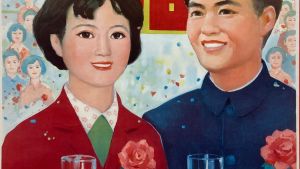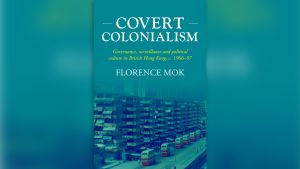China’s Human Rights Lawyers: Rifts and Schisms in an Era of Global Human Rights Backlash
While the ongoing human rights violations in the Xinjiang Uyghur Autonomous Region and the dramatic constitutional collapse of Hong Kong rightly demand most of the attention that the news media, international civil society, and democratic governments can pay to China today, systematic violations of human rights continue throughout the country, and Chinese rights defenders are being persecuted worse than ever (China Human Rights Defenders 2021). To be sure, only a small proportion of the majority population of mainland China is immediately affected by the Party-State’s most violent repression. Also, only a tiny number of people are actively resisting the Party-State by holding it to the promises of human rights protection it has made—inter alia, in the People’s Republic of China’s Constitution, laws, policy statements, and the international human rights treaties to which China has acceded.
Even so, there are compelling reasons to pay attention to the situation of mainland human rights defenders, including human rights lawyers, and to the ‘normalcy’ of their continued persecution. They are resisting a system that not only has produced deeply disturbing mass state crimes at its territorial periphery, but also increasingly exerts power and influence beyond its national borders. It is all the more important to realise that the history of China’s human rights lawyers is one of rifts and schisms, and that today’s divisions also reflect our era’s global backlash against the intertwined ideas of the international rule of law and the indivisibility of human rights.
The Reform Era: ‘Moderates’ and ‘Radicals’
The marginalisation of human rights lawyers during the reform era laid the foundation for the rifts and schisms we are witnessing in the movement today. Some 20 years ago, China’s human rights lawyers began to emerge as a tiny but vocal group of mainly professional lawyers, who insisted on raising the violations of their clients’ human rights as part of their legal advocacy. In so doing, they posed political, as well as legal, challenges to a system of governance in which the violation of certain basic rights—including, in particular, the vital protections of criminal procedure—was deeply entrenched.
As a result, human rights lawyers were not only obstructed, persecuted, and punished by the Chinese Party-State; they also encountered significant pushback from within their own professional ranks and social environments. When, in 2006, I decided to investigate the life and work of Chinese human rights lawyer Gao Zhisheng, what intrigued me most was not the lengths to which he had gone in defending the rights of members of the severely persecuted spiritual group Falun Gong. To be sure, his advocacy was impressive. Gao was among the first human rights lawyers to use the internet to publish an open letter to China’s leadership, in which he raised his clients’ and interlocutors’ horrific torture at the hands of the police and laid the responsibility squarely on the Party-State leadership presiding over a system of governance so utterly lacking in political and legal accountability mechanisms to address these abuses. Only a few weeks after our meeting in Beijing, Gao was himself forcibly disappeared and subjected to extremely brutal torture (Gao 2009).

But while his experiences at the hands of the Chinese Party-State were disturbing and his courage inspiring, what seemed most puzzling was the flak Gao received from people supposedly on his side—including family and colleagues. His family at one point tried to lock him up in their home village, to prevent him from going back to his work in Beijing. Some of his colleagues criticised him for being ‘radicalised’ (a process analysed by Cullen and Fu 2009). By taking up cases certain to provoke the authorities into cracking down, they said, Gao was jeopardising the process of gradual reform and transition towards the rule of law. These critics talked about staying ‘within the law’ but seemed curiously reluctant to consider the rights of Gao’s clients under law. They also thought that raising the torture issue in a public statement outside the context of specific legal cases was unprofessional, and some considered Gao’s criticism of political leaders to potentially be criminal incitement of subversion. Whether or not they were among the ‘radical’ or ‘moderate’ lawyers, all had good reason to be afraid of Party-State retaliation (Pils 2007).
The often-unspoken assumption driving criticism of ‘radical’ human rights defence was that the liberalisation of the political legal system could be expected to come about in the long term, anyway. Implicitly, if not explicitly, political liberalisation was seen as the natural consequence of the decision to reinstitute markets and revive the legal system, which had to operate on rules accommodating a market economy. Sooner or later, this would change China, just as it had changed other formerly socialist systems. The mainstream view therefore saw ‘rights activism and cause lawyering … as subservient to rule of law reform goals’, as I wrote at the time, criticising the ‘moderate–radical’ typology, whereas Gao
acted to help those most in need of defense of their rights. The attitude of lawyers and activists like him accentuates the deep contradictions in China’s current legal and political system. Their experience also indicates the limits of possible reform. (Pils 2007: 1212)
So far as their advocacy did not suit the managerial consequentialism of the age, these lawyers were dismissed by the protagonists of the law and development movement—after all, in their confident predictions of economy-driven developments, Marxist and modernisation theories are famously similar (Avineri 1969).
This broadly consequentialist outlook was also common among transnational civil society organisations and international governments interested in promoting rule of law reform in China, with implications that were not lost on the small group of ‘radical’ human rights lawyers such as Gao. They saw that while the preferred scenario of ‘moderate’, state-tolerated advocacy leading to gradual liberalisation—famously called ‘the soothing narrative’ by James Mann (2007)—dominated international interaction with China, their own more confrontational work on the worst abuses, especially when it connected China’s human rights problems to the need for political change, would remain marginalised, and international actors would hesitate to support them. The reasons for this were complex but (it seemed) often included transnational actors’ very understandable fear of being shut down or kicked out of China. In that, they were not so dissimilar from domestic civil society actors. From the perspective of ‘moderates’, human rights ‘radicals’ like Gao were at best naive in their way of handling risks. ‘They think I am really stupid [傻],’ I recall him commenting, with his characteristic big smile, in our chat in 2006.
In numerous conversations, I had to confront the sense of abandonment and exclusion prevalent among some persecuted human rights lawyers, as they discovered that groups less willing than they to challenge the authorities on their human rights violations did better when competing for attention, resources, and support from transnational civil society organisations, the United Nations, and so on, for promoting human rights in China. With few exceptions, those international groups that did support human rights lawyers, on the other hand, had trouble connecting to them in meaningful ways. Groups like, say, Amnesty International or Human Rights Watch were, of course, not running offices in China; they were brilliant at drawing attention to abuses, but hardly operated as partners or funding organisations. These groups were also working with a UN system that—from the perspective of some human rights lawyers in China—might be admirable in the ambitions of its human rights treaties but was evidently largely powerless in dealing with oppressive governments. This was evidenced, for instance, not only by China’s failure to ratify the International Covenant on Civil and Political Rights, but also—and, more importantly, given its clout within the UN Security Council and Human Rights Council—by its readiness to silence critics within UN human rights mechanisms (Worden 2020; Richardson 2021).
Naturally, the human rights defenders who felt marginalised looked for explanations. Some were attracted to political views that were conservative or right-wing in the domestic politics of liberal democracies, including the United States—views whose scepticism towards globalisation, multilateralism, and international law, often underpinned by the rejection of socialism, may have seemed congenial to their own experience. When right-wing populism gained strength as a political force challenging liberal democracy, as it did with a vengeance in 2016, these leanings were reinforced.
Schisms Today: Right, Left, and Confused
Human rights lawyers today are certainly no less persecuted than when they began to emerge in the 1990s. In the 14 years since his 2007 enforced disappearance, Gao Zhisheng, for example, has suffered horrific cruelty (but never, to my knowledge, has he fully backed down) (Law Society of England and Wales and Lawyers for Lawyers 2021). However, while human rights lawyers remain very marginalised, their numbers have risen; they are far better networked domestically and, on the whole, also better able to reach out to international organisations and governments. This is mainly because, in the long decade from its emergence until the power transition from Hu Jintao and Wen Jiabao to Xi Jinping—which some argue marked the end of the reform era (Minzner 2018)—the human rights lawyer movement has gained access to new forms of communication technology that have allowed lawyers to interact and collaborate in entirely novel ways (Halliday and Liu 2016; Pils 2014).
The relative empowerment of these groups—even though it remained largely at the level of communicative power and, after the early 2000s, rarely translated into significant victories in the legal process—also made them more of a target for the repressive, controlling efforts of the Party-State, which kept expanding its arsenal. Legislative reforms included changes to the criminal process, including the creation of ‘residential surveillance in a designated location’—a mechanism that institutionalised enforced disappearances—and the creation of new offences of violation of courtroom ‘order’, which effectively targeted lawyers engaging in forceful defence of their clients (Pils 2018). More sophisticated methods of persecution ranging from digital surveillance all the way to incarceration, forced drugging, and physical torture were used against human rights lawyers in ever greater numbers. In numerous cases, such methods were used on vulnerable clients’ lawyers, as well as on those lawyers’ lawyers, and the lawyers’ lawyers’ lawyers, and so on.
A sweeping crackdown, initiated in the summer of 2015 with the ‘709 Incident’ (709维权律师大抓捕事件), signalled to domestic and international audiences that repression would no longer be used in secret, but, rather, the Chinese authorities were willing to face down human rights–based international criticism. Plainly innocent ‘culprit’ lawyers were then put on display in show trials, in which they duly expressed guilt and remorse for having opposed the Party, while the government created new rules for the criminal process targeting advocates (Fu 2018; Pils 2018). Due to its severity, the crackdown was somewhat effective, at least in taking those detained ‘out of action’ for a while and in intimidating many others. It also led to rising numbers of people going into exile, where they strengthened the oppositional Chinese diaspora.
At the same time, the liberal-democratic global order, which had seemingly allowed its protagonist nation-states to benefit from engagement with China while claiming this engagement was bound to help China reform, started to erode visibly. Following his election in 2016, US President Donald Trump’s populist and often erratic policy decisions rightly alarmed international human rights organisations, which warned against Trumpism’s corrosive effects on democracy and human rights in the United States and beyond (see, for instance, Roth 2017).
Among human rights defenders in China, however, Trump and Trumpism have brought to the fore—and exacerbated—a schism that pits conservatives, supporters of anti-international sovereigntism, against internationalists, and libertarians against liberal egalitarians. What Lin (2020) has called ‘beaconism’ is likely to have played a role in wider Chinese netizens’ support for Trump (see also Li and Teng’s conversation in the present issue). But the intellectual roots for such support lie in the reception of libertarian thought from the 1980s onwards, when Hayek was popular, but Rawls was not (or not really). For the libertarian group, equality is in deep conflict with liberty—a concept sometimes extended to the idea of collective national self-determination; in their view, ‘social democracy’ or ‘democratic socialism’ entailing coercive redistribution for, inter alia, the purpose of realising socioeconomic human rights, raises the spectre of dictatorship, as does banning certain kinds of speech, such as racist hate speech. These deeply held beliefs render the ‘white left’ (白左)—a generally pejorative term used to designate those who uphold a supposedly Western conception of egalitarian progressive-liberal values—inherently suspect (Zhang 2017). The question, as constitutional law professor Zhang Qianfan (2020) pithily puts it, is whether the Western left is in fact the totalitarian left (西左是极左吗)? From the perspective of the Trumpists among China’s libertarian lawyers, the answer is quite clearly in the affirmative.
The positions outlined here certainly have not gone unopposed among their formerly equally ‘radical’ colleagues. Numerous human rights lawyers—including but not limited to those whose own work focuses on socioeconomic rights, equality, and antidiscrimination efforts—have been sharply critical of certain right-wing views. After the 2020 election in the United States, for example, some Chinese human rights defenders including several lawyers staged a public online debate in an attempt to address their differences through reasoned argument (Bowen Press 2020). In this online workshop, China-based lawyer Lai Jianping expressed enthusiastic support for Trump because he felt a Trump presidency would have been most favourable to the promotion of constitutionalism and democracy in China. Lawyer Sui Muqing (also in China) praised Trump’s ‘conservative liberalism’, his ‘America first’, anti-globalisation, and anti–illegal immigration policies, characterising the last as ‘beneficial for preserving America’s main ethnicity’ and adding that should America change from its current majority-white status, ‘I trust not too many people will still want to emigrate there’. Sui also claimed to be most impressed by Trump’s rejection of ‘political correctness’.
Opposing these views, China-based lawyer Tang Jitian pointed to Trump’s undermining of judicial independence, media scrutiny, and other essential features of US democracy to argue that his presidency could only be bad for the cause of human rights and indeed even raised the spectre of dictatorship taking hold in the United States. Lawyer Liu Shihui, now in the United States, characterised Trump as a ‘latent autocrat’ merely constrained by the US constitutional system, adding that any claim that Trump could more effectively stand up to (autocratic) China was defeated by China’s steady concentration of government power, evidenced by the ‘concentration camps’ in Xinjiang—which, as lawyer and academic Teng Biao pointed out, Trump had on several occasions endorsed—and the imposition of the National Security Law in Hong Kong.
In some ways, debates such as these are evidence of China’s oppositional groups’ deep desire to engage in a democratic process not available to them within the domestic Chinese system. They also signal that the political opposition—oppressed domestically, marginalised in exile—is highly aware of the degree to which China’s affairs are intertwined with global political trends.
But the emergence of a hard right-wing from within the community of human rights lawyers has significant further implications. Supporters of right-wing populism who express beliefs inimical to the very idea of human rights—such as racist beliefs—may no longer even qualify as human rights defenders, if we take the United Nations’ definition with its explicit reference to ‘a belief in equality and non-discrimination’ seriously (OHCHR 2004). This does not mean their advocacy, resistance, and persecution are no longer of concern to the international human rights community, but it does indicate that their opposition to the current system is driven by political ideals far removed from the liberal-democratic norms and institutions of ‘international justice’ that they once appeared to endorse (Vinjamuri 2017).
Implications of a Globalised Schism
Reviewing the evolution of human rights defence in China since the 1990s, it can seem as though China under Xi Jinping had shifted, but not fundamentally changed: China has remained a repressive one-party system, albeit one now descending to new lows of criminality—for example, in Xinjiang. But the realisation that China’s political system will not change as expected with the transition paradigm long dominating liberal democracies’ engagement with the country, alongside a global third wave of autocratisation (Lührmann and Lindberg 2019), democratic retrogression (Huq and Ginsburg 2018), and backlash against the very idea of human rights (Vinjamuri 2017), has altered the dynamics of these lawyers’ interaction.
Considered in this context, it cannot be a surprise that today’s debates among Chinese human rights lawyers are no longer about how to get to an agreed end goal. When human rights lawyers first emerged during the reform era, they and many of their fellow lawyers, legal scholars, and even Party-State officials could generally agree on the need for liberal-democratic transformation, even though not all were explicit about this destination. Today, human rights lawyers are to some extent replicating the schisms of those liberal democracies whose very nature is now threatened; their debates are increasingly also about what should be the end goal of their advocacy and resistance. This trajectory evokes that of former liberal dissidents in countries now governed by populists, such as Poland and Hungary (Applebaum 2020). In their rejection of substantive equality, self-described ‘conservatives’ among Chinese human rights lawyers today sometimes seem to cultivate the fantasy of a twentieth-century–style free world that must be defended against its leftist enemies (and which might still come to their rescue). But the promise of freedom on populism’s anti-pluralist and exclusionary terms is illusory and leads to democratic collapse (Müller 2016). Ironically, therefore, some of China’s most prominent oppositional lawyers are attracted to political leaders who reject the idea of indivisible and interdependent human rights on which so much of these lawyers’ own work in China has been based. ■
Cover Photo: Gao Zhisheng in 2015. PC: RFA.org.





